#Pakistan Muslim League-Nawaz
Explore tagged Tumblr posts
Text
Mian Dilshad Niazi
Date of Birth: 25 January 1973 Father's Name: Mian Muhammad Gender: Male Country: Pakistan
Mian Dilshad Niazi was born and raised in Pakistan, Faisalabad. Mian Dilshad Niazi has made significant contributions as a dedicated member of the Pakistan Muslim League-Nawaz (PMLN). He is a prominent political figure in the region and currently serves as the President of the Social Media Team for PP-114, a key constituency in Faisalabad. His leadership in digital strategy and engagement has played a vital role in promoting the party's initiatives and strengthening its presence online.
Work: (PML)N
Website: Mian Dilshad Niazi
#Mian Dilshad Niazi#Dilshad Niazi#Sadar Mian Dilshad Niazi#pmln#politics#politicians#political party#pakistan muslim league nawaz
1 note
·
View note
Text
Pakistan General Election 2024
General election are going to be held in February 2024 in Pakistan. It should be remembered that before this, the general elections were held on 25 July 2018. In which three major parties of Pakistan participated, namely Pakistan Muslim League-N, Pakistan Tehreek-e-Insaf, and Pakistan Peoples Party. But the Pakistan Tehreek-e-Insaf won 149 seats in the National Assembly While the Pakistan Muslim…
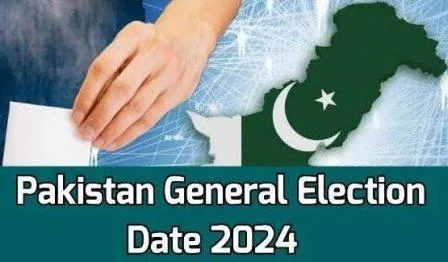
View On WordPress
#Asif Ali Zardari#Benazir Income Support Program#Bilawal Bhutto Zardari#CPEC#development#Election#free#General Election Year 2024#hub#Imran Khan#Imran Khan Niazi#Life#lifestyle#Manifesto#Mian Muhammad Nawaz Sharif#pakistan#Pakistan General Election Year 2024#Pakistan Muslim League-N#Pakistan Tehreek-e-Insaf#Parties#Power#Sardar Awais Khan Leghari#Shaheed Benazir Bhutto#Shaheed Zulfiqar Ali Bhutto#Unemployment
0 notes
Text
Pakistan Economy Crisis: पाकिस्तान की बर्बादी के लिए भारत जिम्मेदार नहीं: नवाज़ शरीफ़
लाहौर: पाकिस्तान के पूर्व प्रधानमंत्री नवाज शरीफ (Nawaz Sharif) ने मंगलवार को कहा कि न तो भारत और न ही अमेरि��ा की वजह से पाकिस्तान नकदी संकट (Pakistan Economy Crisis) से जूझ रहा है। बल्कि पाकिस्तान की जनता ने अपने पैरों पर कुल्हाड़ी मारी है।शरीफ ने देश में बढ़ रहे सभी संकटों के लिए शक्तिशाली सैन्य प्रतिष्ठान को जिम्मेदार ठहराया है। पाकिस्तान मुस्लिम लीग-नवाज (Pakistan Muslim League – N) के टिकट के…
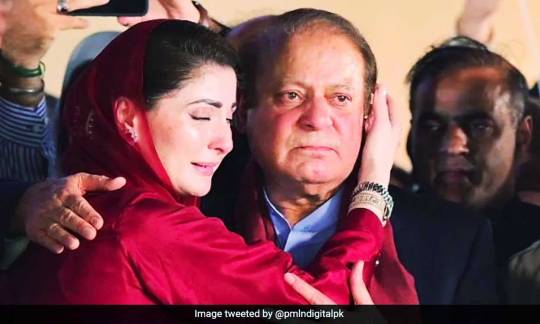
View On WordPress
#Nawaz Sharif#Pakistan crisis#Pakistan Economy Crisis#Pakistan Muslim League#नवाज शरीफ#पाकिस्तान मुस्लिम लीग
0 notes
Text
MIRAN SHAH, Pakistan—Mohsin Dawar’s campaign for re-election to Pakistan’s parliament was almost cut short before it began in early January when his convoy was ambushed in a village just a few minutes’ drive from his home in Miran Shah in Pakistan’s North Waziristan district, near the lawless borderlands with Afghanistan. As his car came under attack from militants armed with automatic weapons, sniper rifles, and rocket-propelled grenades, he and his team were lured into a compound by residents who promised them safety.
It was a trap. Once the gates closed behind Dawar, the attack intensified. For almost an hour, he said, they were pinned down. Police and Pakistan Army backup finally arrived but not before two of Dawar’s team had been shot and injured. The vehicle took more than 80 bullets, and the windows show just how accurate the attackers’ aim was: Either one of the shots to the windshield or passenger window would have struck and likely killed him if he hadn’t been protected by bulletproof glass.
The Jan. 3 attack on a popular, outspoken, liberal leader in one of the most vulnerable regions of a country fighting a growing insurgency by extremist militants hardly registered in Pakistan, where most believe the military attempted—and failed—to manipulate the Feb. 8 election in an effort to install Nawaz Sharif as prime minister for a fourth time and where media operate under tight government control.
The election wasn’t quite the foregone conclusion that had been expected, with candidates aligned with the jailed cricket star-turned-populist leader Imran Khan winning more votes than each of the major parties—the Pakistan Muslim League-Nawaz (PML-N) and the Pakistan Peoples Party—forcing them into a coalition to get the majority needed to form a government. PML-N leader Nawaz Sharif nominated his brother, Shehbaz Sharif, to become prime minister and his daughter Maryam Nawaz as chief minister of Punjab province, ensuring the dynastic line continues.
Candidates across the country, not only those loyal to Khan, alleged that the results had been rigged against them and in favor of military-backed candidates. Two days after the election, with his seat still undeclared amid growing concerns nationwide about vote rigging, Dawar and about a dozen of his supporters were injured when security forces opened fire on them as they gathered outside the official counting room.
At least three people died of their injuries; What Dawar had believed was an unassailable lead, according to polling by his secular National Democratic Movement party, had disappeared. In the count that was listed as final by Pakistan’s Election Commission, the seat went to Misbah Uddin of the Taliban-aligned Jamiat Ulama-e-Islam-Fazl party. Dawar is still recovering from a serious leg wound.
Dawar’s hometown is, once again, the battleground of what he calls “Project Taliban”—a war against the Pakistani state.
The Taliban’s transnational ambitions are threatening security beyond the borders of Afghanistan, and nowhere is this more evident than in Pakistan’s northwest, where the militant presence has been growing since the terrorist-led group came back to power in August 2021. Attacks on civilians, soldiers, and police have soared. The region bristles with checkpoints and hilltop outposts and is heavily patrolled on the ground and in the air by the Pakistan Army and armed border police. That’s during daylight hours, Dawar told Foreign Policy. Once night falls, it’s a different story.
“The Army checkposts you will only see during the daytime. Before sunset, they go to their barracks, and the people of Waziristan are at the disposal of the militants. Everyone has to secure himself or herself for their own protection,” he said. “It is militarized, and I believe it is a continuation of a proxy war that was started long ago. ‘Project Taliban’ is still continuing.”
The roots of militancy and terrorism in Waziristan go back to colonial times, when the mostly Pashtun people here were characterized as fearless fighters and pressed into service for the British. The stereotype stuck; the region became a center of recruitment and training for young men to fight the Soviets after Moscow’s 1979 invasion of Afghanistan.
After the United States led an invasion of Afghanistan in 2001 in retaliation for the 9/11 attacks, leaders of the Taliban and al Qaeda moved over the border and for the following 20 years enjoyed the protection of the Pakistani military’s intelligence wing, the Inter-Services Intelligence (ISI) agency.
The ISI wanted a tame Taliban-led Afghanistan to thwart the ambitions of archrival India to become the dominant regional power. The Taliban had different ideas. The group’s return to power has inspired affiliated and like-minded groups worldwide, as the extremist regime provides safe haven for dozens of militant groups, according to the U.N. Security Council. They now openly use Afghanistan as a base to train fighters seeking to overthrow governments from China and Tajikistan to Iran and Israel. Among them is Tehrik-i-Taliban Pakistan (TTP), which, Afrasiab Khattak, a former Pakistani lawmaker and now a political analyst, said, is “just Taliban, there is no difference.”
Earlier this month, the Taliban reiterated the group’s stance on the international border between Afghanistan and Pakistan when the acting foreign minister, Sher Mohammad Abbas Stanikzai, said the government doesn’t recognize the Durand Line that has delineated the two countries since 1893. The line runs through the tribal regions, dividing ethnic Pashtun and Baloch tribespeople. Recent bilateral tensions have often focused on the border, with tit-for-tat closures impacting cross-border trade.
In comments that Pakistan’s foreign ministry later called “fanciful” and “self-serving”—and which underlined the simmering hostility between Pakistan and the Taliban it helped put in power���Stanikzai said: “We have never recognized Durand and will never recognize it; today half of Afghanistan is separated and is on the other side of the Durand Line. Durand is the line which was drawn by the English on the heart of Afghans.”
The Security Council said in 2022 that the TTP had up to 5,500 fighters in Afghanistan. That number has likely risen, Dawar said, as neither country, mired in economic mismanagement and crisis, can offer its youthful population an alternative livelihood. Victory brought strength, Dawar said, and the Taliban “can attract the youth because money and power is what attracts youth the most.”
The simmering conflict threatens to return Pakistan’s northwest to the wasteland of less than decade ago, when the TTP controlled the region: Dissenters were routinely killed. Terrorists turned the Federally Administered Tribal Areas (FATA), now part of Khyber Pakhtunkhwa province after an administrative merger in 2018, into a death zone. Millions of people were displaced as those who could leave fled to peace and safety.
Those who stayed lived in fear and poverty until the Army finally took action in 2016 and ended the TTP’s 10-year reign by simply killing them, often in attacks that also killed civilians, or pushing them over the porous border into Afghanistan, where they joined Taliban forces fighting the U.S.-supported republic until it collapsed in 2021.
The TTP wants an independent state in these border regions. It broke a cease-fire with the government in November 2022 and has demanded that the merger of the FATA with Khyber Pakhtunkhwa be reversed. Attacks on the military and police have escalated alarmingly, presenting what a senior government official, who spoke anonymously, called “not only an existential threat to the state but also to the common man”—a recognition that what Dawar calls “Project Taliban” not only threatens to engulf the northwest but, if not contained, poses a potential threat to a fragile and barely stable state.
Caretaker Prime Minister Anwaar-ul-Haq Kakar disagreed, telling reporters before the Feb. 8 vote that the military had the upper hand in the region, by virtue of numbers alone. “I don’t see that they pose an existential threat to the state of Pakistan,” he said, while nevertheless conceding it was a “big challenge” that could take years to dislodge.
He could be right. After the failure of peace talks, ironically brokered by the Taliban’s acting interior minister, U.N.-listed terrorist Sirajuddin Haqqani, Pakistan stepped up pressure on the TTP. Asfandyar Mir, an expert on South Asian political and security issues, said this appeared to have made a “marginal” difference.
“For instance, we haven’t seen a complex or suicide bombing attack by the TTP or one of its fronts for a couple of months now,” he said. “In that sense, it appears the Taliban is sensitive to pressure,” though “smaller-scale attacks and the erosion of Pakistani state authority in parts of the northwest continue.” Things could change, he said, once a new government is installed and, perhaps, brings some stability to the political landscape.
For the people of Waziristan, struggling to survive unemployment, a lack of development, and government neglect of basic services such as roads, electricity, clean water, and education—coupled with a downturn in vital cross-border trade with Afghanistan—priorities have again switched to peace. “The local people have learned through their own bitter experience of devastating war” what a Taliban resurgence means, said Khattak, the political analyst. The security establishment is playing a dangerous game, indulging the TTP so that “local people become so desperate they want the military to come in and help them,” he said.
Hundreds of thousands of people have marched through the streets and bazaars of North and South Waziristan over the past year, demanding action against terrorism and an end to state violence. Yet it continues. “No one is safe. Everyone is a target,” said a man in his 30s as he rolled off a list of potential victims: politicians, business people, teachers, doctors, journalists, civic activists, women’s rights advocates, anyone deemed “un-Islamic.” Even barbers are not immune from extremists who ban men from shaving: The day before the Jan. 3 attack on Dawar’s convoy, the bodies of six young hairdressers were found in the nearby town of Mir Ali.
Another local resident pointed to a “Taliban checkpoint” on the road between Miran Shah and the bustling town of Bannu. The long-haired, kohl-eyed, gun-toting youths in sequined caps stand outside their roadside hut in the shadow of an Army post on the hill above. Around the clock, the resident said, they randomly stop vehicles to shake down the drivers. “It’s just for money,” he said. “Money and power.”
But it’s killing, too, “on a daily basis,” said a government worker who left Miran Shah with his family at the height of the TTP terror and visited in early February from Peshawar so he and his wife could vote for Dawar. The aim, he said, is “to create an atmosphere of fear so that people leave and what is here is theirs.”
Dawar said the turning of the Taliban tables on Pakistan “was predictable.” The Taliban “are now a threat to Central Asia. They are now a threat to Iran, to Pakistan, and to even China. All of them thought we will control the Taliban after the takeover. The problem is it didn’t happen,” he said.
In 2011, then-U.S. Secretary of State Hillary Clinton warned Pakistan’s leaders that they couldn’t keep “snakes,” as she called the Taliban, in their own backyard and “expect them only to bite your neighbors.”
“There used to be a time when people were sent from here to Afghanistan. Now they are coming around, they are biting,” Dawar said.
4 notes
·
View notes
Text
Pakistan Shehbaz Sharif Hindu Minister Attack By Mob in Sindh after Asim Munir Statement We are different from Hindi
Pakistan hindu minister attack: The protesters who took out a rally against the plan of new canals in Sindh province of Pakistan have attacked a Hindu Minister of State. Pakistan Muslim League-Nawaz MP and Minister of State for Religious Affairs Kheel Das Kohistani was passing through Thata district on Saturday (April 19, 2025), when the protesters threw tomatoes and potatoes at their convoy and…
0 notes
Text
2022 Country Reports on Human Rights Practices:
PAKISTAN
EXECUTIVE SUMMARY!
Pakistan is a federal parliamentary republic. On April 11, parliament elected Pakistan Muslim League-Nawaz’s Shehbaz Sharif as prime minister and head of government. This parliamentary election, conducted in accordance with procedures in the constitution, followed a successful no-confidence vote in the National Assembly called by opposition parties, which replaced the ruling Pakistan Tehreek-e-Insaf administration by bringing to power a coalition government led by Pakistan Muslim League-Nawaz.
In 2018, the Pakistan Tehreek-e-Insaf party won the most National Assembly seats in the general elections, and the party’s leader, Imran Khan, became prime minister. While independent observers noted technical improvements in the Election Commission of Pakistan’s management of the polling process itself, observers, civil society organizations, and political parties raised concerns regarding pre-election interference by military and intelligence agencies that created an uneven electoral playing field. Some political parties also alleged significant polling day irregularities.
Police have primary domestic security responsibility for most of the country. Local police are under the jurisdiction of provincial governments. Paramilitary organizations, including the Frontier Corps that operates in Balochistan, Khyber Pakhtunkhwa, and the former Federally Administered Tribal Areas, as well as the Rangers that operate in Sindh and Punjab, provide security services under the authority of the Ministry of Interior. The Frontier Corps’ primary mission is security of the border with Afghanistan, and the corps reports to the Ministry of Interior in peacetime and the army in times of conflict.
The military plays a role in domestic security, including as the lead security agency in many areas of the former Federally Administered Tribal Areas. While military and intelligence services officially report to civilian authorities, they operate independently and without effective civilian oversight or control. There were reports that members of the security forces committed numerous abuses.
Significant human rights issues included credible reports of: unlawful or arbitrary killings, including extrajudicial killings by the government or its agents; forced disappearance by the government or its agents; torture and cases of cruel, inhuman, or degrading treatment or punishment by the government or its agents; harsh and life-threatening prison conditions; arbitrary detention; political prisoners; transnational repression against individuals in another country.
Also arbitrary or unlawful interference with privacy; serious restrictions on free expression and media, including violence against journalists, unjustified arrests and disappearances of journalists, censorship, and criminal defamation laws, and laws against blasphemy; serious restrictions on internet freedom; substantial interference with the freedom of peaceful assembly and freedom of association, including overly restrictive laws for the operation of nongovernmental organizations and civil society organizations; severe restrictions of religious freedom; restrictions on freedom of movement; serious government corruption;
And lack of investigation of and accountability for gender-based violence; crimes involving violence or threats of violence targeting members of racial and ethnic minorities; crimes involving violence or threats of violence targeting lesbian, gay, bisexual, transgender, queer, or intersex persons; the existence or use of laws criminalizing consensual same-sex sexual conduct between adults; restrictions on workers’ freedom of association; and existence of the worst forms of child labor.
There was a lack of government accountability, and abuses, including corruption and misconduct by security services, often went unpunished, fostering a culture of impunity among perpetrators. Authorities seldom investigated or punished government officials for reported human rights abuses or acts of corruption.
\
Violence, abuse, and social and religious intolerance by militant organizations and other nonstate actors, both local and foreign, contributed to a culture of lawlessness. Terrorist violence and human rights abuses by nonstate actors contributed to human rights problems, with terrorist violence exceeding that of the prior year.
Terrorist and cross-border militant attacks against civilians, soldiers, and police caused hundreds of casualties. Military, police, and other law enforcement agencies continued to carry out significant campaigns against militant and terrorist groups.
0 notes
Text
MPA Arshad Javed Warraich passes away
Deceased PMLN local MPA Chaudhry Arshad Javed Warraich. — pap.gov.pk/File SIALKOT/ISLAMABAD: Pakistan Muslim League-Nawaz (PMLN) local MPA Chaudhry Arshad Javed Warraich passed away here on Monday. Arshad Javed Warraich was elected in general elections of 2024 as MPA from PP-52 constituency and he was presently the Parliamentary Secretary for Social Welfare and Baitul Maal. Federal Minister Kh…
0 notes
Text
With the compliments from, the Directorate General Public Relations,
Government of the Punjab, Lahore. 99201390
No.255
HANDOUT (A)
PML-N President Muhammad Nawaz Sharif & CM Maryam Nawaz Sharif Meet Interior Minister Mohsin Naqvi
Lahore, 02 April 2025: President Pakistan Muslim League-N Muhammad Nawaz Sharif and Chief Minister Punjab Maryam Nawaz Sharif met Interior Minister Mohsin Naqvi to discuss overall law & order situation in Punjab, besides matters of mutual interest. Situation in Kachha area and matters related to provincial border posts also came under discussion in the meeting. They reaffirmed their commitment to cooperate in dealing with Khawarij terrorists to improve law & order situation in the province.
** **
0 notes
Text
Senate Chairman Yusuf Raza Gilani's Discontent with the Government Continues

Senate Chairman Yusuf Raza Gilani's dissatisfaction with the government remains intact. This discontent stems from the issue of the non-implementation of the production orders for an opposition senator.
Yusuf Raza Gilani will still preside over the Senate session today, but production orders for Senator Ejaz Chaudhry have not been issued for this session. The Senate meeting will take place today at 11:30 AM in the Parliament House.
Senator Irfan Siddiqui, the parliamentary leader of the Pakistan Muslim League-Nawaz (PML-N), confirmed the Chairman’s discontent. He mentioned that the Senate Chairman is in Karachi for personal work, and today’s session will be presided over by the Deputy Chairman or the Presiding Officer. He also stated that efforts would be made to resolve the issue with the Chairman.
It is worth noting that Yusuf Raza Gilani had boycotted the chairmanship of the last session in protest. Despite announcements, the government failed to reconcile with the Senate Chairman. According to parliamentary sources, the production orders for Ejaz Chaudhry have not been issued for the new session.
0 notes
Text
PML-N Government Expands Federal Cabinet with 27 New Ministers
Islamabad, February 27, 2025, In a bold step, the Pakistan Muslim League-Nawaz (PML-N) led coalition government welcomed 27 new members into its federal cabinet today. The oath-taking ceremony took place at 5:00 pm at Aiwan-e-Sadr, the president’s official residence in Islamabad, with President Asif Ali Zardari presiding. This expansion increases the cabinet size from 29 to 46 members, bringing…
0 notes
Text
Access to Imran becomes sticking point in talks
ISLAMABAD: Talks between the Pakistan Muslim League-Nawaz (PML-N)-led ruling coalition and the Pakistan Tehreek-e-Insaf (PTI) hit a snag on Tuesday after the opposition’s negotiating team was denied access to PTI founder Imran Khan, according to the PTI. At a press conference, PTI leadership questioned why they were not allowed to meet their incarcerated leader, despite assurances from the…
0 notes
Text
The results of Pakistan’s general elections on Feb. 8 reflected widespread dissatisfaction with the country’s civil and military establishment, but they seem to have brought about the opposite of what many voters wanted. Independent candidates affiliated with former Prime Minister Imran Khan’s Pakistan Tehreek-e-Insaf (PTI) party—barred from running under its banner—won more seats in parliament than any major party, but not enough for a majority. Parliamentary arithmetic necessitates a coalition, and Khan, who is in prison on corruption charges, refuses to negotiate with his rivals.
Pakistan’s next government will instead be formed by a coalition of legacy parties, including the center-right Pakistan Muslim League-Nawaz (PML-N), led by former Prime Minister Nawaz Sharif, and the center-left Pakistan Peoples Party (PPP), led by former President Asif Ali Zardari and his son, Bilawal Bhutto Zardari. On Feb. 8, Pakistan’s entrenched political order—in which parties vie for votes as well as the powerful military’s favor—was jolted but did not crumble. Although PTI’s surprising performance damaged the military’s reputation and mystique, the military’s ability to influence the course of events remains intact.
The latest episode in Pakistan’s game of thrones comes amid a serious economic crisis as well as security threats from the resurgent Tehrik-i-Taliban Pakistan (TTP) and other militant groups. Political polarization makes it difficult to address Pakistan’s swelling debt and deficit. With a GDP of $340 billion, Pakistan must repay nearly $78 billion in external debt before 2026. Imposing taxes on key sectors of the economy—agriculture, real estate, retail—is difficult without political consensus. And amid the uncertainty, various loss-making state-owned enterprises, from Pakistan International Airlines to the country’s power distribution companies, which collectively cost the government around $1.7 billion annually, cannot be privatized.
Pakistan also needs a comprehensive strategy to deal with jihadi groups, which are now responsible for terrorist attacks inside the country but were once encouraged or tolerated as part of unconventional warfare against India and a way to secure influence in Afghanistan. Populist narratives blaming India, Israel, and the United States for holding back Pakistan’s progress hinder action against extremists, who portray themselves as Islamist heroes. Meanwhile, peace with India, relations with the West, and ties to economic benefactors in the Arab world are now held hostage to Pakistan’s internal divisions: Those holding office at any given time are often accused by their opponents of selling out Pakistan’s interests.
If there was ever a time for Pakistan’s squabbling politicians to form a government of national unity, it would be now. Given the fragmented election results and allegations of vote-rigging, a stable cross-party government could pave the way for the military’s withdrawal from politics. It could also help Pakistan transition away from its long-standing tradition of one major politician or another being in jail—such as Khan—while their supporters are harassed. Parliamentary debates on alternative policy ideas could replace the current shouting matches between rival leaders’ supporters about who is more corrupt.
But rather than inspiring unity, the coalition government that is taking shape will immediately face opposition from Khan’s supporters. As things stand, it seems unlikely that Pakistan’s divisions will end anytime soon. The results of last week’s elections confirmed voters’ weariness with the political elite and dynastic politics, as well as with the meddling—both overt and covert—by the country’s generals. Widespread dissatisfaction with the economy and the absence of opportunities for Pakistan’s burgeoning young population have given rise to populist politics that will not lead to reconciliation.
Khan, the cricket star-turned-quintessential populist leader, dismisses the idea of a negotiated settlement with his political opponents. He has built a powerful narrative of victimhood that blames Pakistan’s political elites and foreign conspiracies for the country’s problems. His grandiloquence may not offer realistic solutions, but it does create an outlet for powerless people to vent their rage and frustration. Khan seems to believe that a revolution could give him greater power than embracing the idea of a new national pact. Instead of using PTI’s electoral success to talk to the other major parties, Khan has offered an alliance proposal to two minor religious parties, although one of them has already refused the partnership.
After his initial arrest in May 2023, the former leader encouraged attacks against military installations, according to an aide; he could now encourage violent protests against alleged election rigging in another attempt to ignite a street revolution. But the May 9 attacks paved the way for a harsher crackdown on PTI than if there had not been violent turmoil. Hundreds of party activists were arrested while thousands faced intimidation from security services. It would be irresponsible of Khan to put his supporters’ lives and freedom at risk.
Ironically, Khan came to power in 2018 with the help of Pakistan’s military and security services as a crusader against corrupt civilian politicians. The generals built up Khan as an alternative to these politicians, many of whom had quarreled with the military at some point in the past. But Khan also ran afoul of the military as prime minister because he defied the generals’ wishes and mismanaged the economy; his populism harmed Pakistan’s precarious external relations. To remove Khan from office, the military turned to the same politicians it had sought to discredit.
After his ouster in a parliamentary no-confidence vote, Khan saw an opportunity to continue his anti-elite bombast, adding the country’s top generals to the list of villains from whom he would save Pakistan. His supporters lapped it up. The military has influenced the country’s politics for decades, but it now faces a unique challenge. Khan has poisoned even traditionally pro-army constituencies by arguing that the generals were acting at the behest of the United States—allegations that Washington denies—and against Pakistan’s interests. Military leaders have now been trying to get an entire nation to change direction away from Khan for nearly two years with little success.
The generals and their new civilian allies may have assumed that jailing Khan, bringing back Sharif from exile, and implementing repressive measures—such as barring PTI-affiliated candidates’ access to the media—would ensure the election result that they wanted. Instead, young PTI activists used social media to mobilize voters and upended the establishment’s plans.
Still, the reaction of voters to the Pakistani military’s highhandedness is unlikely to unleash a revolution. In the short term, the country will continue to have a weak civilian government willing to work closely with the military while Khan will remain in prison and his party will remain out of power. Any widespread political violence will only result in a clamor for the military to take over and restore order.
For years, Pakistan’s military has repeated the cycle of “elect, dismiss, disqualify, and arrest�� for civilian politicians. But in the long term, the country’s leaders must collectively address the widespread frustration and polarization that has contributed the success of Khan’s populism. Although unlikely, Khan changing tack and accepting political compromise could also help ease Pakistan’s pain. In any case, the hostility toward the military’s political role among its former supporters makes it difficult for generals to act as if nothing has changed.
3 notes
·
View notes
Text
'Free Imran Khan': PTI welcomes Trump's aide statement as PML-N calls for 'respecting sovereignty' - Geo News
December 25, 2024 The Pakistan Tehreek-e-Insaf (PTI) has welcomed the statement of Richard Grenell, US President-elect Donald Trump’s nominee as envoy for special missions — who advocated for the release of incarcerated party founder Imran Khan, with the ruling Pakistan Muslim League-Nawaz (PML-N) urging the United States to respect the country’s sovereignty.Grenell, who is also a close confidant…
0 notes
Text
25 December: Birthday of Pakistan prominent Leader Nawaz Sharif
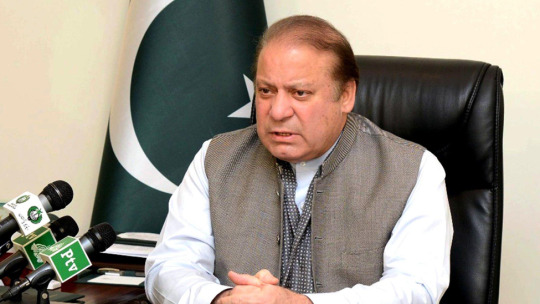
Nawaz Sharif, born on December 25, 1949, in Lahore, Pakistan, is a famous Pakistani politician and businessman who has been the country's Prime Minister three times: from 1990 to 1993, 1997 to 1999, and 2013 to 2017.
Sharif belongs to the prominent Sharif family, whose business empire is the Ittefaq Group, interested in sugar, steel, and textiles. He got an LL.B. from the University of the Punjab at Lahore before entering his family's business.
Political Career
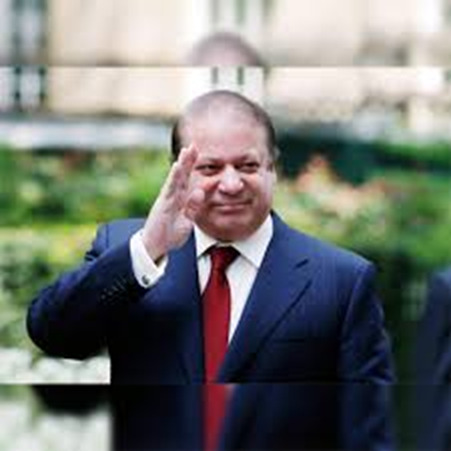
Sharif started his political career in the early 1980s as he was appointed the Finance Minister of Punjab province. Later he took the position of Chief Minister of Punjab in 1985 and continued until 1990.
He won his first term as the Prime Minister of Pakistan through the Pakistan Muslim League (Nawaz) [PML-N] as the leader in October of 1990. It was after the dismissal of Prime Minister Benazir Bhutto by President Ghulam Ishaq Khan when using his rights under a constitutional clause granting him the right to dissolve the elected government if they were deemed corrupt or ineffectual. During his first term, Sharif pursued economic liberalization and infrastructural development.
Second Terms
However, his tenure was cut short in 1993 after conflicts with the President resulted in his resignation. In 1997, he regained power with a handsome majority in parliament, thus allowing him to implement constitutional amendments that curtailed presidential powers and enhanced the role of the Prime Minister.
His second term witnessed Pakistan's first nuclear tests in 1998, a response to India's tests, which led to international sanctions. In 1999, his government was overthrown in a military coup led by General Pervez Musharraf, resulting in Sharif's exile to Saudi Arabia.
After years in exile, Sharif returned to Pakistan and re-entered politics. He remained as Prime Minister in 2013 for a third time, concentrating on the matters of economic reforms, energy projects, and infrastructure, which included the start of the China-Pakistan Economic Corridor (CPEC).
Jail term and Allegations
However, he also faced allegations of corruption in his term, for which he was disqualified from holding office by the Supreme Court of Pakistan in 2017 after the Panama Papers leakage. Since then, he has been under constant legal pressures and received convictions in prison for corruption cases. In 2019, for medical treatment, he arrived in London on bail.
In addition, he has also been declared an absconder by a Pakistan court; however, subsequently, the Islamabad High Court had granted him protective bail in the Avenfield and Al-Aziza cases. In 2023, after four years of exile, he made a comeback to Pakistan, for which he was acquitted by the Islamabad High Court in the Avenfield and Al-Azizia Steel Mills cases.
Family and Personal Life
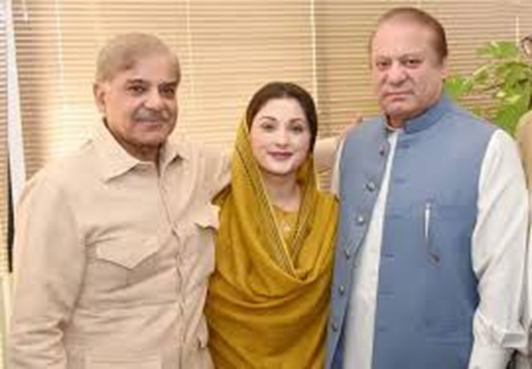
Nawaz Sharif is married to Kulsoom Nawaz who died in 2018. He has four children, one of whom, Maryam Nawaz, is actively involved in the politics of Pakistan. His younger brother, Shehbaz Sharif, is also an important political figure, who served as the Chief Minister of Punjab and later became the Prime Minister of Pakistan.
Legacy and Impact

Sharif's political life has been characterized by remarkable success and scandals. Major infrastructure projects and moves towards economic liberalization marked his rule. However, charges of corruption and battles with the military have also characterized much of his political career. He has led the PML-N through a good part of the country's political history for decades now.
Recent Developments
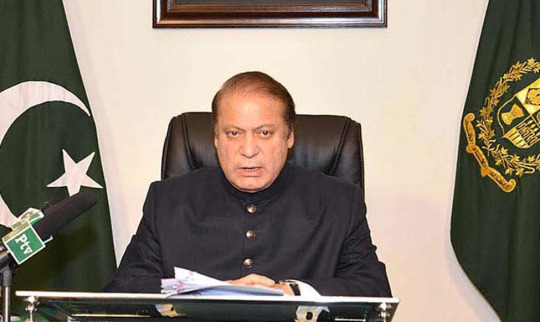
As of December 2024, Nawaz Sharif continues to be a prominent Pakistani politician. His return from exile and acquittal by the courts in major cases of corruption has rejuvenated his political fortunes. As of now, the PML-N remains one of the major political forces within the country, with Nawaz Sharif playing an important role in its control and strategy.
Stay tuned, visit Nawaz Sharif's Journey: From Prime Minister to Politics and Imprisonment.
0 notes
Link
0 notes
Text
2022 Country Reports on Human Rights Practices:
PAKISTAN
EXECUTIVE SUMMARY!
Pakistan is a federal parliamentary republic. On April 11, parliament elected Pakistan Muslim League-Nawaz’s Shehbaz Sharif as prime minister and head of government. This parliamentary election, conducted in accordance with procedures in the constitution, followed a successful no-confidence vote in the National Assembly called by opposition parties, which replaced the ruling Pakistan Tehreek-e-Insaf administration by bringing to power a coalition government led by Pakistan Muslim League-Nawaz.
In 2018, the Pakistan Tehreek-e-Insaf party won the most National Assembly seats in the general elections, and the party’s leader, Imran Khan, became prime minister. While independent observers noted technical improvements in the Election Commission of Pakistan’s management of the polling process itself, observers, civil society organizations, and political parties raised concerns regarding pre-election interference by military and intelligence agencies that created an uneven electoral playing field. Some political parties also alleged significant polling day irregularities.
Police have primary domestic security responsibility for most of the country. Local police are under the jurisdiction of provincial governments. Paramilitary organizations, including the Frontier Corps that operates in Balochistan, Khyber Pakhtunkhwa, and the former Federally Administered Tribal Areas, as well as the Rangers that operate in Sindh and Punjab, provide security services under the authority of the Ministry of Interior. The Frontier Corps’ primary mission is security of the border with Afghanistan, and the corps reports to the Ministry of Interior in peacetime and the army in times of conflict.
The military plays a role in domestic security, including as the lead security agency in many areas of the former Federally Administered Tribal Areas. While military and intelligence services officially report to civilian authorities, they operate independently and without effective civilian oversight or control. There were reports that members of the security forces committed numerous abuses.
Significant human rights issues included credible reports of: unlawful or arbitrary killings, including extrajudicial killings by the government or its agents; forced disappearance by the government or its agents; torture and cases of cruel, inhuman, or degrading treatment or punishment by the government or its agents; harsh and life-threatening prison conditions; arbitrary detention; political prisoners; transnational repression against individuals in another country.
Also arbitrary or unlawful interference with privacy; serious restrictions on free expression and media, including violence against journalists, unjustified arrests and disappearances of journalists, censorship, and criminal defamation laws, and laws against blasphemy; serious restrictions on internet freedom; substantial interference with the freedom of peaceful assembly and freedom of association, including overly restrictive laws for the operation of nongovernmental organizations and civil society organizations; severe restrictions of religious freedom; restrictions on freedom of movement; serious government corruption;
And lack of investigation of and accountability for gender-based violence; crimes involving violence or threats of violence targeting members of racial and ethnic minorities; crimes involving violence or threats of violence targeting lesbian, gay, bisexual, transgender, queer, or intersex persons; the existence or use of laws criminalizing consensual same-sex sexual conduct between adults; restrictions on workers’ freedom of association; and existence of the worst forms of child labor.
There was a lack of government accountability, and abuses, including corruption and misconduct by security services, often went unpunished, fostering a culture of impunity among perpetrators. Authorities seldom investigated or punished government officials for reported human rights abuses or acts of corruption.
\
Violence, abuse, and social and religious intolerance by militant organizations and other nonstate actors, both local and foreign, contributed to a culture of lawlessness. Terrorist violence and human rights abuses by nonstate actors contributed to human rights problems, with terrorist violence exceeding that of the prior year.
Terrorist and cross-border militant attacks against civilians, soldiers, and police caused hundreds of casualties. Military, police, and other law enforcement agencies continued to carry out significant campaigns against militant and terrorist groups.
0 notes